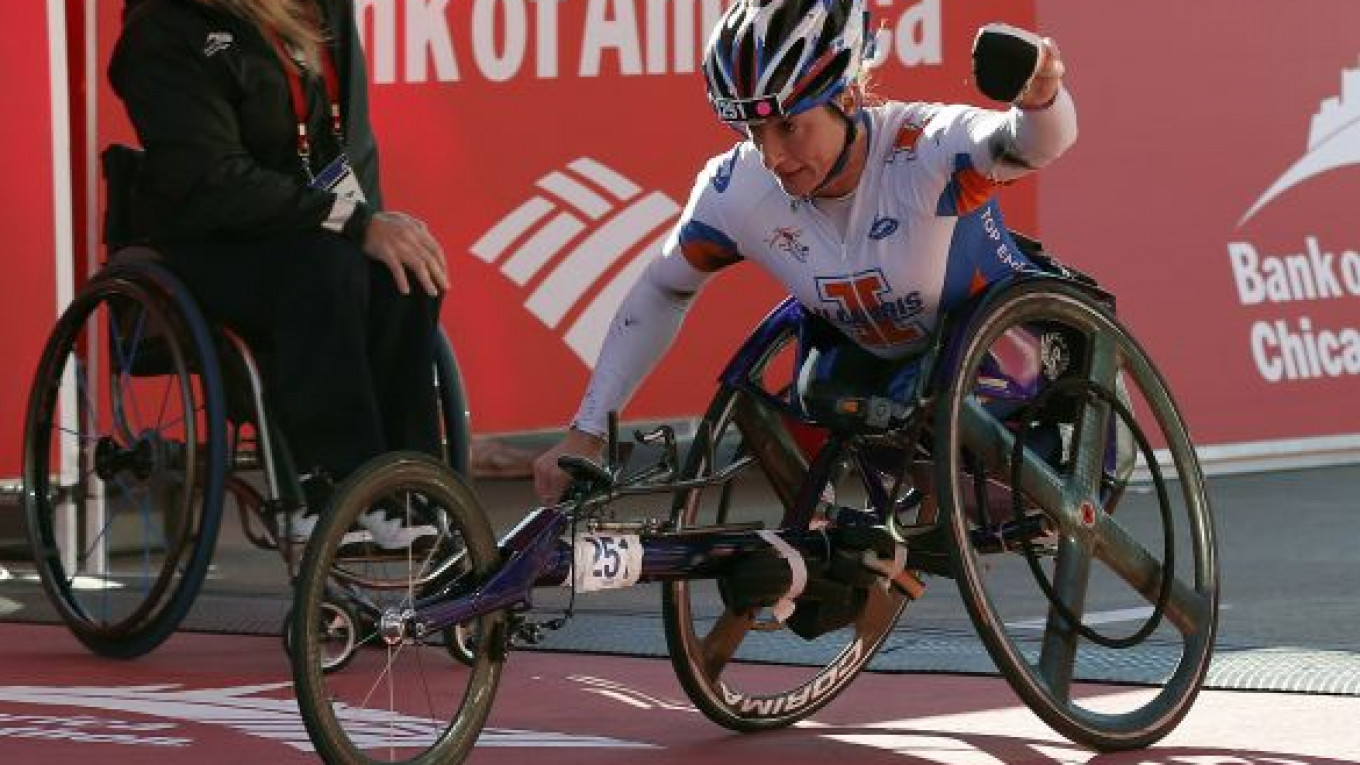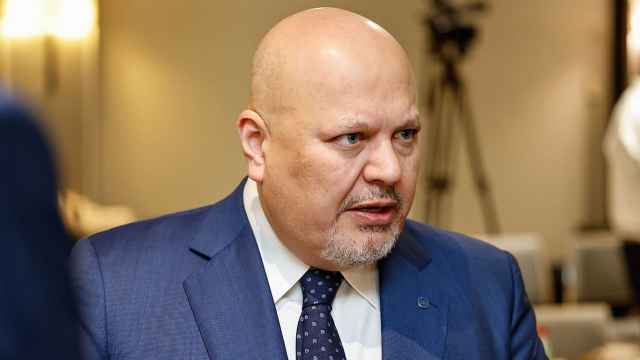NEW YORK — After Tatyana McFadden won the 2010 New York City Marathon wheelchair race, she flew to her former orphanage in Russia and gave the director her medal.
She will have more to show off if she wins again in New York on Sunday.
McFadden is aiming to complete the first "grand slam" in wheelchair marathon racing after winning the three major races this year: in Boston, London and Chicago.
The 24-year-old University of Illinois student let up on training this week to focus on exams before heading to New York on Thursday. McFadden, who was born with spina bifida and cannot use her legs, will graduate in December with a degree in child development.
Adopted by Deborah McFadden from a St. Petersburg orphanage at age 6, Tatyana grew up in Clarksville, Maryland. She had several surgeries and was not expected to live, but she rallied and her mother enrolled her in swimming, basketball and athletics.
McFadden is "excited and nervous" about going for the grand slam, knowing it will be "very tough" to compete on the hilly New York course. Her rivals include Manuela SchКr of Switzerland, whom McFadden edged in Chicago on Oct. 13 en route to smashing a 21-year course record with a time of 1 hour, 42 minutes, 35 seconds.
McFadden also won the Boston Marathon on April 15, nearly four hours before two bombs went off near the finish line and killed three people. Six days later, she dedicated her London Marathon win to the victims.
Here are five things to know about McFadden, who earned three track gold medals at the 2012 London Paralympics and plans to compete in downhill skiing in February at the Sochi Paralympics.
No flats please: She is hoping to avoid tire-flattening potholes on the uneven streets of New York. McFadden has raced three times through the five boroughs, getting "tire blasts" in 2009 and 2011, when she finished third. She avoided getting a flat when she won the title in 2010.
If she gets a blowout, McFadden will change the tire herself with a spare and pump because "no one can help us or we're disqualified. It's pretty critical not to get a flat with this group of girls — elite runners — because it's hard to catch up to the top three with a flat." Along with SchКr, who won the Berlin Marathon, the field includes fellow American Amanda McGrory, the 2011 NYC Marathon winner.
DVD highlights: Orphanage director Natalia Vasilyevna cried when McFadden handed her the medal. McFadden, who used her hands and arms to get around the orphanage, showed the staff a DVD of herself driving a car with hand controls, racing track in school, playing wheelchair basketball and downhill skiing.
"There were stunned looks to meet the infirmed girl, who many didn't think would live," Deborah McFadden said. "It was cognitive dissonance."
Her daughter called it a "fulfilling" homecoming to talk with the staff and children.
"I wanted to give back and say 'Thank you,'" she said. "They'd never had anyone come back and do that. I'd shown how I've overcome my disability. For an athlete like myself, we advocate and go into schools, into hospitals. The Paralympics is public and all over the media.
"In Russia it's different, people with disabilities don't live the lifestyle like here in America. It's about education and the culture, too."
McFadden plans to become a child life specialist, helping critically ill children and their families.
"I had one growing up, and she definitely had an impact on my life," McFadden said of the specialists at Johns Hopkins and Shriners Hospital for Children in Philadelphia, where she had surgeries.
Young phenom: Adam Bleakney has coached McFadden on the Illinois wheelchair track team for five years. He knew about her track prowess as a 10-year-old and watched the "phenom" compete at junior national meets. "You could see the athleticism; physically, the strength and well-developed arms and traps," he said.
She won silver and bronze medals in sprints at the 2004 Athens Paralympics and three silvers and a bronze at the 2008 Beijing Games. Bleakney suggested she race the 26.2 miles of the 2009 Chicago Marathon — her first — and she won.
This year in Chicago, she pushed to a course record with headwinds at the start and finish on the mostly flat course "using continuous energy — you don't coast down the hill — averaging about 15 miles per hour."
Ten teammates at Illinois will race on Sunday, along with Bleakney.
Boston finish: Because wheelchair racers start first, McFadden crossed the finish line in Boston about 11 a.m. with a winning time of 1:45:24. She underwent the drug testing required of all winners, spoke to the media and left the finish area about 20 minutes before the first bomb went off, her mother said. They were at their nearby hotel, "thinking the first bomb was some sort of celebration, but then all chaos broke out after the second bomb, so we knew."
Many of the injured near the blasts lost limbs, and McFadden and four other U.S. paralympians who competed in London a week later dedicated their races to the victims.
Equality fighter: Despite winning two medals at the 2004 Athens Paralympics, McFadden faced obstacles competing on her Atholton High School track team. She and her mother sued the state of Maryland, and "Tatyana's law" now ensures Maryland students with disabilities can participate with peers in sports.
McFadden tried unsuccessfully to derail a 2012 Russian law that prohibits adoptions of Russian children by American parents. Deborah McFadden first met Tatyana while working as a commissioner of disabilities for the U.S. Department of Health and Human Services. She also adopted 17-year-old Hannah, who competes in track as an above-the knee amputee and 14-year-old Ruthi, who plays basketball.
The orphanage director and people who helped with McFadden's adoption plan to travel to Sochi to watch her compete in February.
A Message from The Moscow Times:
Dear readers,
We are facing unprecedented challenges. Russia's Prosecutor General's Office has designated The Moscow Times as an "undesirable" organization, criminalizing our work and putting our staff at risk of prosecution. This follows our earlier unjust labeling as a "foreign agent."
These actions are direct attempts to silence independent journalism in Russia. The authorities claim our work "discredits the decisions of the Russian leadership." We see things differently: we strive to provide accurate, unbiased reporting on Russia.
We, the journalists of The Moscow Times, refuse to be silenced. But to continue our work, we need your help.
Your support, no matter how small, makes a world of difference. If you can, please support us monthly starting from just $2. It's quick to set up, and every contribution makes a significant impact.
By supporting The Moscow Times, you're defending open, independent journalism in the face of repression. Thank you for standing with us.
Remind me later.






